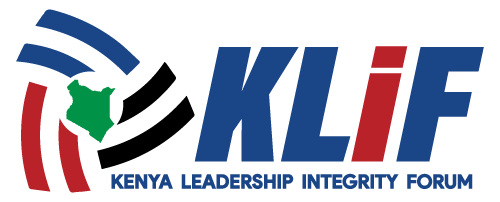The Kenya Leadership Integrity Forum (KLIF) has launched its strategic plan for 2023 – 2028.
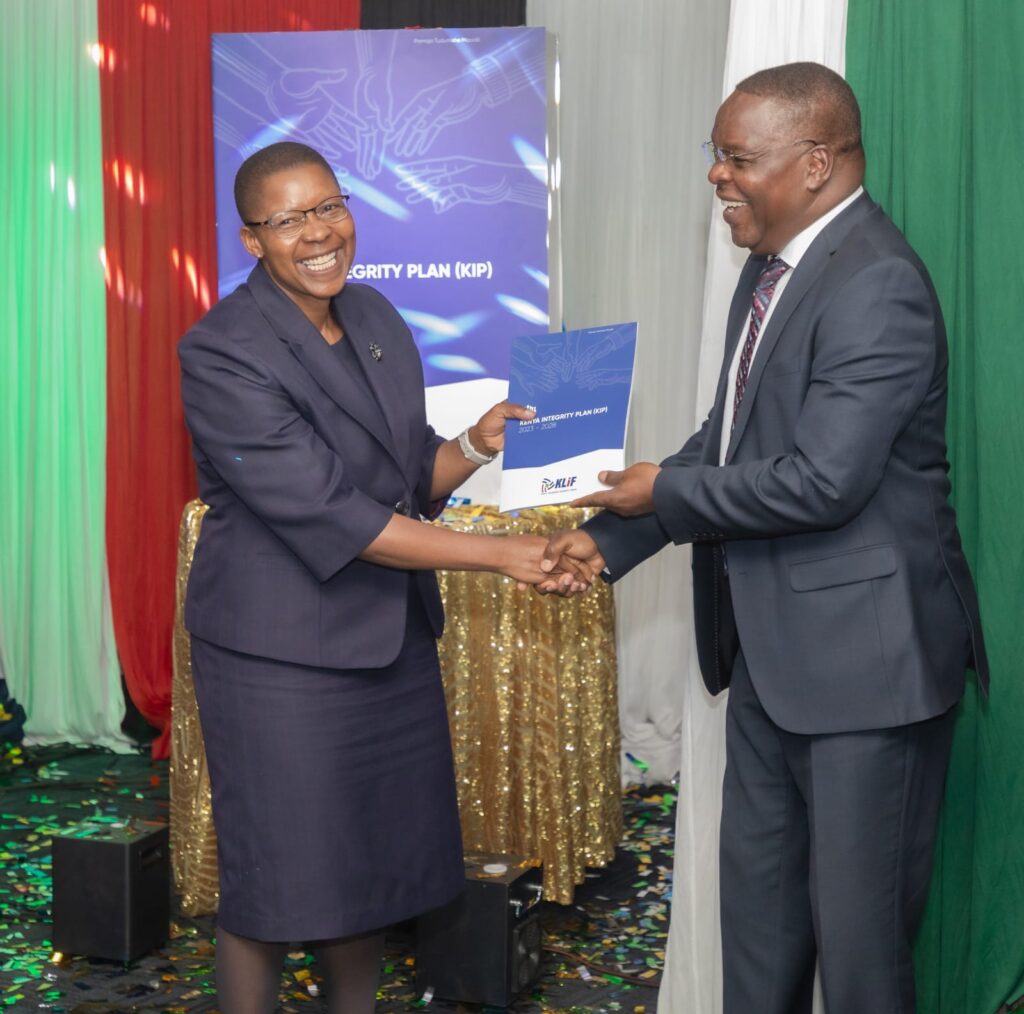
KLIF is a partnership and governance initiative to fight corruption in the public and private sectors in a unified and integrated manner. Its secretariat is domiciled within the Ethics and Anti-Corruption Commission. Dubbed the Kenya Integrity Plan (KIP) and unveiled yesterday at the Kenya International Conference Centre (KICC), it was initiated in 2023, and despite its late launch, the stakeholders have already been implementing it. KIP is founded on four strategic objectives, underscoring a commitment to helping the nation achieve its developmental goals. From left, Vice Chairperson of EACC Dr. Monica Muiru, CEO Mr. Mohamud and Chairperson Dr. Oginde keenly following the presentation of the Kenya Integrity Plan during its launch at KICC They include enhancing KLIF’s capacity, strengthening the policy, legal, and institutional framework for fighting corruption, and promoting ethics and integrity in the public and private sectors and society. Speaking at the event, the Attorney General, Hon. Dorcas Oduor, and the Chief Guest called the launch a significant national occasion. “This is a momentous occasion, not only for the institutions represented here but for the entire nation, as we reaffirm our unwavering commitment to integrity, transparency, and accountability in all facets of public and private life,” said Hon. Oduor, who is also the Chairperson of the National Coordinating Committee (NCC) of KLIF. The Attorney General said integrity is the cornerstone of a thriving democracy and a key pillar of sustainable development. A nation that upholds the principles of good governance, honesty, and ethical leadership, she said, ensures the prosperity of its people. The Integrity Plan, she said, is a call to action. “It serves as a comprehensive framework that emphasizes prevention, detection, enforcement, and civic engagement in promoting integrity and ethics.” Dr. David Oginde, the Chairperson of EACC and the Alternate Chairperson of KLIF’s NCC, noted that KLIF’s goal is to have an enlightened community on ethics and improved institutional and personal integrity, which will be necessary to realize the Government’s Bottom-up Economic Transformation Agenda. For his part, the Commission’s CEO, Mr. Abdi A. Mohamud, said the Kenya Integrity Plan is a product of a consultative and engaging process between partner agencies and other stakeholders. The plan’s overarching objective, he said, is to establish a more structured and coordinated framework for implementing programmes aimed at mainstreaming integrity in both the public and private sectors. The event was attended by representatives of KLIF’s stakeholders, including the National Youth Council, Transparency International – Kenya, Association of Professional Societies in East Africa (APSEA), United Nations Office on Drugs and Crime (UNODC), Office of the Director of Public Prosecutions (ODPP), Public Service Commission, Auditor General, and the Judiciary.
EACC Chairperson, A.G. commit to a vibrant Kenya Leadership Integrity Forum
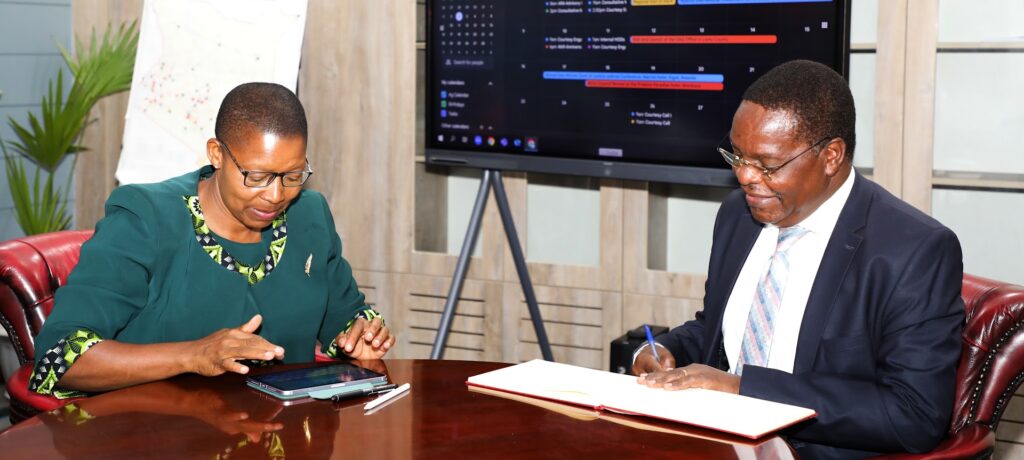
EACC Chairperson Dr. David Oginde and the Hon. Attorney General Dorcas Oduor have reiterated their commitment to a unified stakeholder approach to fighting corruption through the Kenya Leadership Integrity Forum (KLIF) platform. Speaking when she hosted EACC Chairperson Dr. David Oginde at Sheria House yesterday, the Honorable Attorney General said promoting good governance and anti-corruption measures were crucial in accelerating national progress and attaining development goals. Hon. Oduor chairs KLIF, with Dr. Oginde as the alternate Chairperson. KLIF is a governance partnership initiative that brings together 20 state and non-state sectors, including the Executive, Legislature, Judiciary, County Governments, Labour, Anti-Corruption Agencies, Enforcement and Oversight Agencies, Media, Private Sector, Professional Bodies, Education, Civil Society, Faith Sector, Constitutional Commissions, Development Partners, Transport Sector, and Regulatory Bodies in the Financial Services Sector. This initiative fosters stakeholder collaboration, promoting ethical leadership, good governance, and anti-corruption initiatives in Kenya. The Solicitor General, Hon. Shadrack Mose, Chief State Counsel, Ms Sophia Sitati, and Head of the Kenya Leadership Integrity Forum, Ms Joyce Munene, were also present.
We will collaborate with the youth to develop a culture of integrity
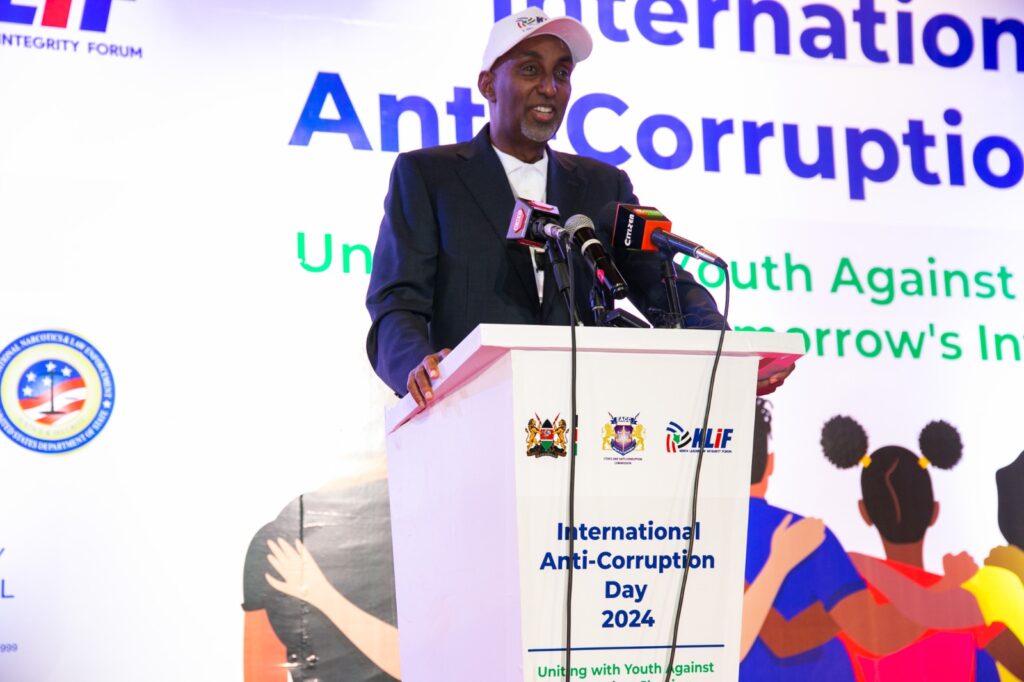
The Ethics and Anti-Corruption Commission (EACC) is working on an anti-corruption legal and policy advocacy framework through which young people can champion laws, regulations, and policies in both the corporate and public space that will enhance good governance, the Commission’s Chairperson, Dr. David Oginde, has said. Dr. Oginde (pictured above) was giving a keynote address yesterday during the commemoration of International Anti-Corruption Day (IACD) at Strathmore University. IACD has been observed annually on December 9 since the passage of the United Nations Convention Against Corruption on 31 October 2003 to raise public awareness for anti-corruption. In Kenya, it is organized by EACC in partnership with the Kenya Leadership Integrity Forum (KLIF). This year’s IACD theme, ‘Uniting with Youth Against Corruption: Shaping Tomorrow’s Integrity,’ focused on empowering young people as key drivers in the fight against corruption. The commemoration brought together participants from diverse sectors, development partners, the public, and especially the youth whose associations were represented by leaders from the Ethics Ambassadors Network, Kenya Young Parliamentarian Association, SOS Children’s Villages, the University of Nairobi, and Strathmore University. The fight against corruption, Dr. Oginde said, is a fight for justice, good governance, and the future of our country. He said young people have the energy, creativity, and passion that, if channeled correctly, could bring down the giant of corruption. In undertaking its mandate, the Chairperson said the Commission wants to collaborate with all stakeholders in learning institutions and all other places where they are found to develop a culture of integrity, ethics, and good use of public resources. “We have established several measures to help educate our young people. We have school outreach programmes targeting institutions of learning at all levels to help our young people begin to develop a culture of integrity. We have established integrity clubs to promote values and ethics and develop attitudes of honesty, service, ethics, and moral conduct among young people. The Commission has participated in developing curricula that can entrench ethics and integrity within our education sector. If taken seriously, these measures could help us move in the direction we need to go,” he said. Corruption, he said, starts at a personal level. It is, therefore, a choice you make that you want to be ethical in your conduct when you are still young. He urged everyone to develop a personal moral conscience, an internal sense of right and wrong, so you do not need a police officer, a parent, or EACC to distinguish what is bad for you. He also urged the youth to develop a personal moral identity and shun group mentality. Your moral identity, he said, can be founded on the guidance of your parents, teachers, or God, which then becomes a stand that guides what you do when in an ethical dilemma. The Chairperson, who was the guest of honor at the commemoration, also challenged the youth to refuse to participate in corrupt activities like cheating in exams, acquiring fake certificates, bribing for jobs, or selling their bodies for favors. He called upon them to whistle-blow on corruption, share innovative ideas to help combat it in the face of technological advancement, and get off the fence and participate in governance processes. The Commission’s CEO designate also addressed the occasion. Mr. Abdi Mohamud Ahmed pledged to ramp up partnerships with the youth and other key stakeholders in the fight against corruption. “Partnership with the youth, in our assessment, is very critical in the fight against corruption. As we move forward into next year, as a Commission, partnership with the youth and other stakeholders in the fight against corruption will be critical and key in the activities we will be undertaking,” he said. Mr. Ahmed called on the youth to practice their aspirations into adulthood and not change after acquiring leadership positions. Also present at the commemorations were the Vice Chancellor Strathmore University, Dr. Vincent Ogutu, CEO National Youth Council, Gloria Wawira, Executive Director Transparency International – Kenya, Sheila Masinde, Director International Narcotics and Law Enforcement Affairs, Maureen Mimnaugh, Regional Representative UNODC, Ashita Mittal, British High Commissioner to Kenya, H.E. Neil Wigan, and H.E Ambassador Henriette Geiger, European Union Ambassador to Kenya.
Kenya observes African Anti-Corruption Day with focus on strengthening whistleblower mechanisms
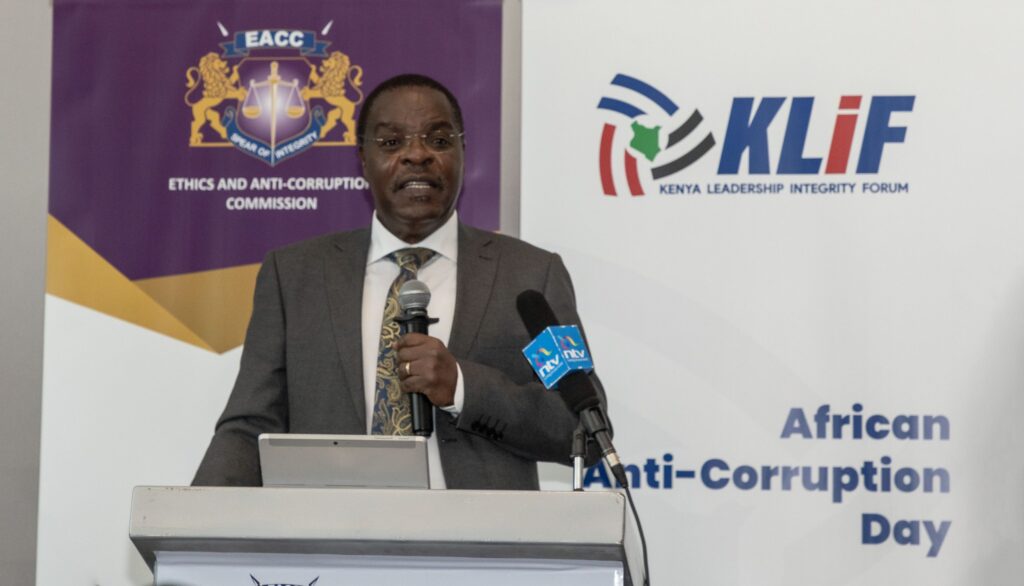
Kenya joined the rest of the Member States of the African Union (AU) in commemorating the African Anti-Corruption Day yesterday. July 11th of every year is set aside so that concerned Africans can pause to reflect on anti-corruption progress in their communities in regards to the successful or unsuccessful anti-corruption initiatives and interventions and to chat the way forward. Yesterday’s commemoration theme reflected on the reforms required to strengthen existing whistleblower mechanisms including protection of whistleblowers, effective anonymous reporting systems and the role of citizens in advancing the elusive quest for accountable governance. The Ethics and Anti-Corruption Commission (EACC) led Kenya in celebrating the day in an event organized at Raddison Blu Hotel in Nairobi where it was joined by Kenya’s development partners and representatives of the Kenya Leadership Integrity Forum (KLIF). KLIF is a stakeholder’s forum consisting of 15 sectors that partner in the fight against corruption and unethical practices in Kenya. It brings together stakeholders from the public and private sectors, civil society and religious organizations to map out an integrated approach to preventing and combating corruption including the Legislature, Judiciary, Executive, EACC, Enforcement and watchdog agencies, County Governments, Media and Religious Sector. Speaking at the event, EACC Chairperson, Dr. David Oginde noted that whistleblowing is key in the anti-corruption endeavours as it ensures that corruption, due to fear of reprisal, goes neither undetected nor unpunished. He also observed that whistleblowing in Kenya is adversely affected by trust deficit in public institutions. For Kenya to overcome the challenge of corruption, Dr. Oginde said, all state and non-state actors must play their roles in weeding out corruption and stressed the importance of putting in place mechanisms for whistleblower protection and enhanced good governance. Dr. Oginde appreciated that for Kenya, this year’s commemoration of the African Anti-Corruption Day comes in the wake of an increased clamour by the youth for accountability and good governance in the country. He encouraged all stakeholders to engage in finding lasting solutions to the prevailing challenges. Mr. Twalib Mbarak, EACC’s Chief Executive Officer revealed that whistleblowing is a critical source of information about the secretive acts of corruption, perpetrators and schemes employed to defraud the public and that the Commission has over the years investigated complex cases of corruption arising from information provided by whistleblowers. Mr. Mbarak called on the National Assembly to prioritise enactment of Whistleblowers Protection Bill, which will encourage more Kenyans with information on corruption and unethical conduct to report without fear or adverse consequences. Pointing to EACC’s National Ethics Corruption Survey 2023, Ms Elizabeth Duya of Transparency International Kenya said 61.1% of people believe whistleblowers are likely to face retaliation, and only 28.2% feel they are adequately protected. Ms Duya said that historical cases like the Goldenberg and Anglo Leasing scandals, along with recent issues involving the National Hospital Insurance Fund and the Maasai Mara University demonstrate the persistent dangers whistleblowers face, including job loss, legal battles, and even death. July 11 marks the day the AU adopted the African Union Convention on Preventing and Combatting Corruption (AUCPCC) in Maputo, Mozambique on 11 July 2003. The Convention came into force in 2006 and as of August 2021, it had been ratified by 44 Member States of the African Union.
Dr Oginde to lead KLIF as Attorney General’s co-chair
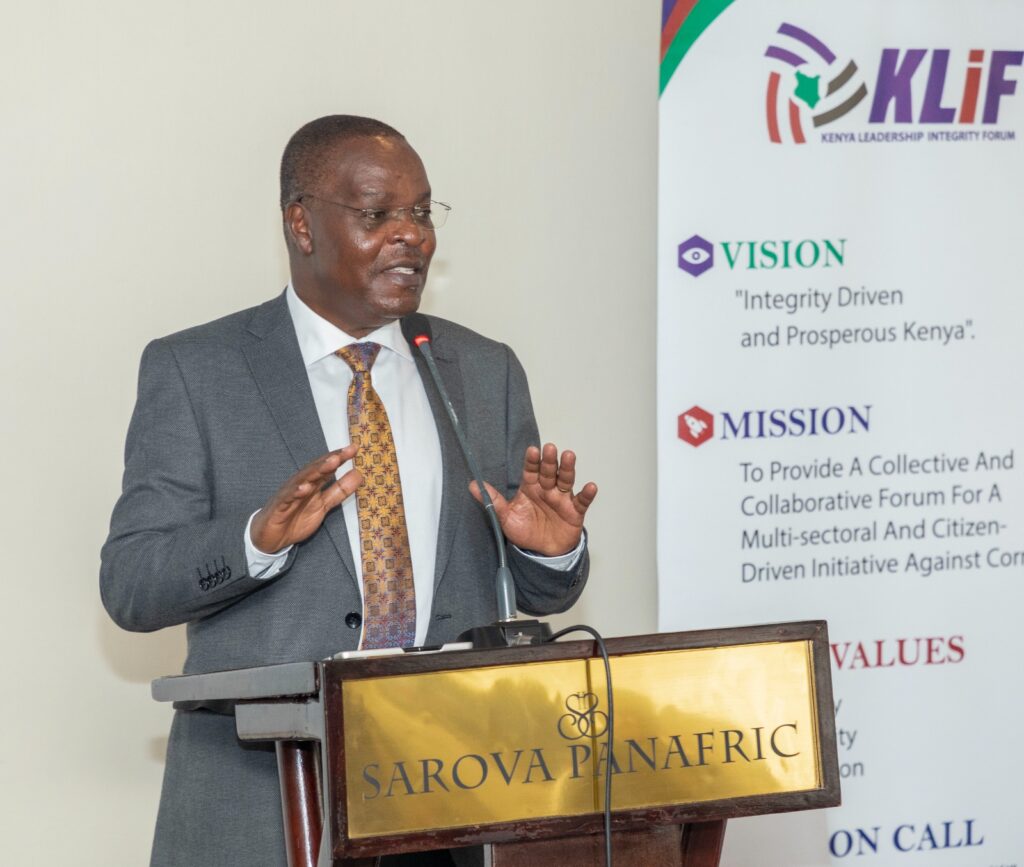
The Kenya Leadership Integrity Forum (KLIF) today elected Ethics and Anti-Corruption Commission (EACC) Chairperson, Dr. David Oginde as its alternate Chairperson. Dr. Oginde was elected unanimously during KLIF’s National Coordinating Committee meeting at a hotel in Nairobi. Ms. Sheila Masinde, the Executive Director of Transparency International (K) was also elected Vice Chair. EACC’s Secretary/CEO Mr. Twalib Mbarak is the Secretary to the Forum and coordinates the agenda of stakeholder engagement in the fight against corruption. EACC also provides the Secretariat which is headed by Ms Petronilla Kyengo EACC’s CEO, Mr Twalib Mbarak and Chairperson, Dr David Oginde at the KLIF’s National Coordinating Committee meeting where Dr Oginde was elected KLIF’s alternate Chair The Attorney General is the designated chairperson of KLIF and the election of an alternate chair was so that he or she can provide leadership whenever the Attorney General, whose office is heavily laden with national duties, is unavailable. Dr. Oginde, while accepting his new lead role in KLIF called on those present to lead by example. “We want to appeal to all of us, good citizens who are seated in this room, let us be champions of that which is right,” he said. KLIF’s National Coordinating Committee also adopted a five-year strategic plan, Kenya Integrity Plan (KIP) 2023-2028. The plan is characterized into four strategic objectives including to enhance the capacity of KLIF to implement a collective approach in the fight against corruption; promote strengthening of policy, legal and institutional framework in the fight against corruption; promote Ethics and integrity in public and private sector, and; to promote ethics and integrity in the society. With H.E the President as patron, KLIF is a multi-sector forum bringing together stakeholders for a unified and integrated fight against corruption. The Forum is comprised of 20 sectors including the Executive, Anti-Corruption Agencies, the Civil Society, Faith Sector, the Private Sector, the Media and other State and non-state actors.
KLIF Launches Anti-Corruption Week in Kiambu County
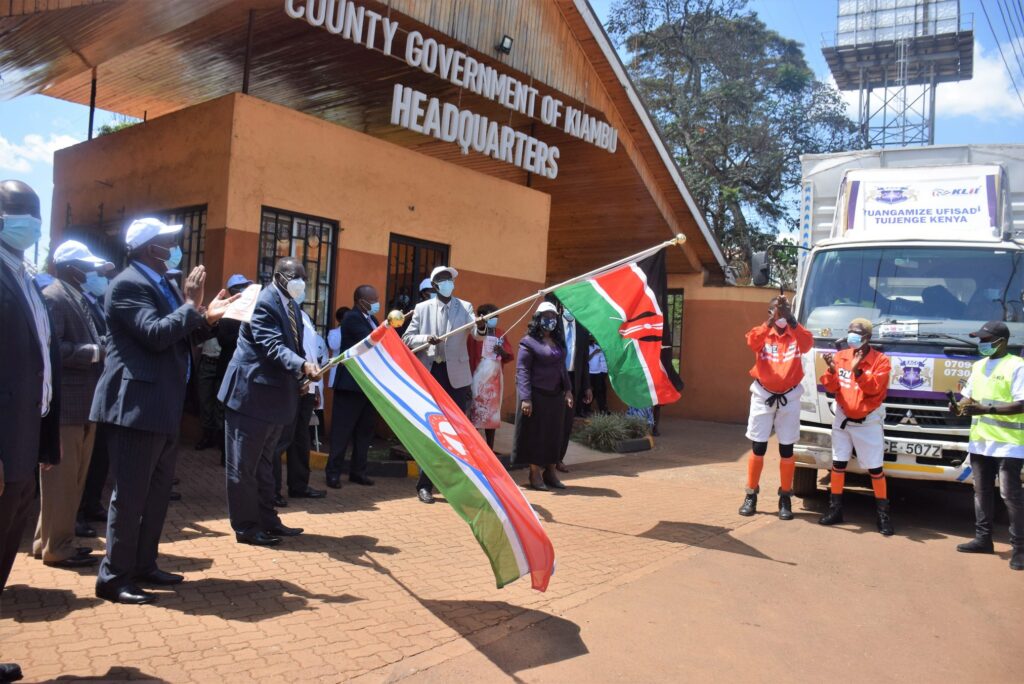
The Kenya Leadership Integrity Forum (KLIF) has launched a weeklong series of awareness and sensitization activities in Kiambu, Nandi and Nyamira Counties, which will culminate in the commemoration of the International Anti-Corruption Day on 9th December 2020. The activities include training programmes for Kiambu Interfaith Council, County Assembly Members and staff, County Executive Committee and Chief Officers, County Directors and sub-county wards, and public officers from the national government. Also scheduled are outreach programmes targeting all of Kiambu’s sub-counties, and a final public baraza on the 9th of December. KLIF, a grouping of state and non-state actors for a unified and integrated fight against corruption, is domiciled under the Ethics and Anti-corruption Commission (EACC). The Forum flagged off the commemoration at Kiambu County Headquarters where EACC Chairman Archbishop (Rtd.) Eliud Wabukalaexplained that the three counties were chosen to as a demonstration of EACC’s commitment to working with county governments in the graft war and promotion of good governance. He challenged everyone to actively join in the fight against corruption, which he noted has derailed the prosperity of the country. “It is noteworthy that all of us are united in dealing with the challenge of corruption, which has continued to derail our social, economic and political prosperity,” he said. The launch of the anti-corruption activities, he stated, aims to raise public awareness of the evils and effects of corruption on people’s lives and their role in the fight against corruption. “To empower the general public to demand effective and efficient corruption free services in the national and county government; and to rally the national and county governments in the fight against corruption among others, is what these activities aim to achieve,” the Chair added. Referring to the theme for this year’s commemoration of the International Anti-Corruption Day — Recover with Integrity” — the Chair urged the County to put measures in place to mitigate the risks that have emerged – including mismanagement of public resources and corruption in response to the Covid-19 pandemic. “As we all know, corruption at times thrives in times of crisis and the ongoing global pandemic has not been an exception,” he said. He warned against embezzlement of public resources, noting that the Commission is vigilant and taking measures to deal with the challenges of the pandemic, which include: He pointed out that the Commission has issued a specific advisory to county governments, ministries, departments and agencies on procurement of supplies and equipment related to, among others, mitigation of the COVID-19 pandemic. The EACC Chairman urged everyone to embrace integrity and ethical conduct as the cornerstones to recovery from the pandemic. “Corruption is a matter of the heart,” he said, “it is the inside where the evil of corruption comes from. Sanitize from the inside”. Speaking during the flagging off ceremony, Kiambu County Assembly Speaker Stephen Ndichu, thanked the Commission for choosing the County as the national host of the International Anti-Corruption Day commemoration activities. He urged everyone to support EACC in the fight against corruption, noting that “corruption is a spirit and as such it should be fought in the spiritual realms”. Governor James Nyoro pledged his county’s support in the fight against graft. He specifically thanked the Commission for carrying out a Corruption Risk Assessment in 2018, and noted that the county is implementing the recommendations arising from that exercise. He also stressed on the need for holding people to account in the management of public resources. “We must hold each other to account. At the end of this week we want to say, yes, it can be done,” he said. IACD Background The International Anti-Corruption Day (IACD) is commemorated in recognition of the devastating effects of corruption in the society. The United Nations Convention Against Corruption (UNCAC) under Articles 5, 12 & 13 provides for involvement of public, private, civil society among other actors in the fight against corruption and expects state parties to mainstream these through legislation, policies and other formal structured arrangements. Kenya was the first country to sign the Convention in 2003 in Merida, Mexico. The aspiration of the Convention is for everyone to work together to enhance integrity in various sectors and institutions because corruption transcends all without exception and no single entity can eradicate it alone.
